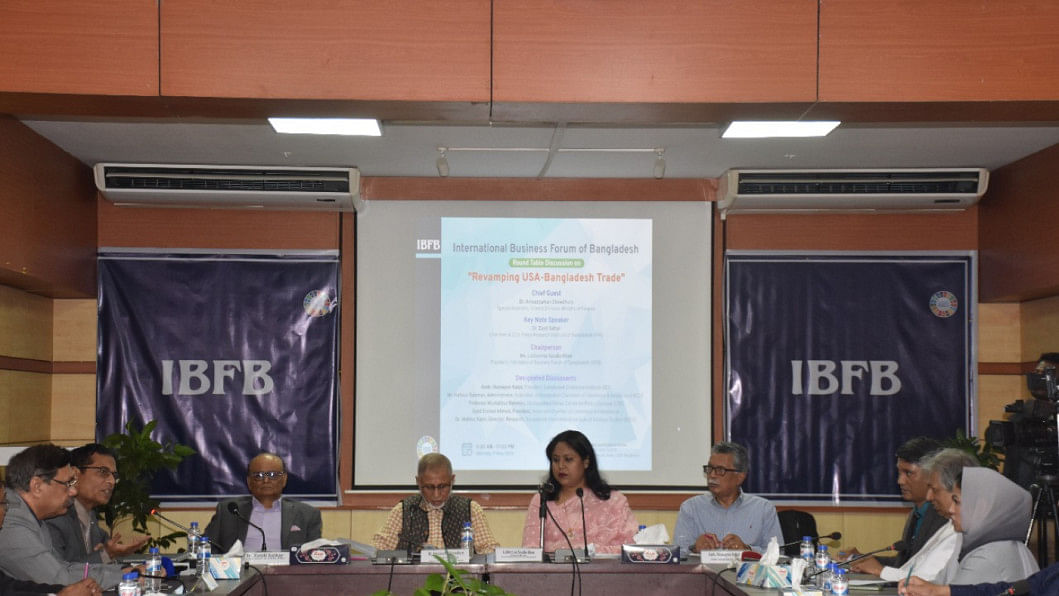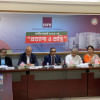Trump tariff highlights the need for diversifying exports: special assistant to CA

The Trump tariff serves as a wake‑up call for Bangladesh, said Anisuzzaman Chowdhury, special assistant to Chief Adviser Professor Muhammad Yunus.
"In the current circumstances, we must diversify our exports to meet this challenge and, at the same time, move toward value addition," he said at a discussion yesterday.
The International Business Forum of Bangladesh (IBFB) organised the discussion, styled "Revamping USA-Bangladesh Trade", at the IBFB office in the capital.
Recently, US President Donald Trump announced reciprocal tariffs and later suspended them for three months.
"International circumstances have changed, and we must build self-confidence while focusing on diversifying our export markets," Chowdhury said.
The government plans to establish a specialised trade negotiation body ahead of Bangladesh's graduation from least-developed country (LDC) status, he added.
M Humayun Kabir, former ambassador and vice-president of the Bangladesh Enterprise Institute, said there is a trust deficit in the United States toward Bangladesh when it comes to negotiations on such trade matters.
"We must work on how to build and sustain that trust," he said.
Zaidi Sattar, chairman of the Policy Research Institute of Bangladesh, in his keynote presentation, highlighted the importance of engaging with the USA to negotiate tariff reductions on key export items such as agricultural products and machinery.
He recommended focusing on low-revenue items and reducing tariffs on non-garment goods to help curb anti-export bias.
Bangladesh could benefit from trade diversification, particularly considering China's growing tariff burden, he said, adding that collaboration with international buyers is needed to share increased costs, stressing that Bangladesh's limited bargaining power makes flexible pricing arrangements essential.
Prof Mustafizur Rahman, distinguished fellow at the Centre for Policy Dialogue, said Bangladesh needs to strengthen its trade negotiation capacity.
He said signing a free trade agreement or preferential trade agreement with the United States is possible, but Bangladesh is still not ready for that.
Rahman also said that although US tariffs are described as reciprocal, in reality, they are irrational and one-sided.
He highlighted the importance of raising the tariff issue within the TICFA (Trade and Investment Cooperation Forum Agreement) platform but acknowledged that Bangladesh is not yet adequately prepared for such discussions.
Syed Ershad Ahmed, president of the American Chamber of Commerce in Bangladesh, said there are not only tariff barriers in Bangladesh but many non‑tariff barriers as well.
For example, he said that clearing imported goods from the customs department requires 17 signatures and takes 7 to 8 days.
"Although it takes a long time to clear cargo here, in Vietnam it takes less than a day. As a result, we're losing out in competition. In this situation, modernising the customs department is very essential," he said.
Lutfunnisa Saudia Khan, president of the IBFB, said the suspension of the Generalised System of Preferences (GSP) benefits, along with the rise of protectionist trade policies in recent years, has affected Bangladesh's competitiveness in vital sectors such as garments, leather, and light manufacturing.
The suspension of GSP has slowed export growth, hindered job creation, and dampened investor confidence.

 For all latest news, follow The Daily Star's Google News channel.
For all latest news, follow The Daily Star's Google News channel. 







Comments